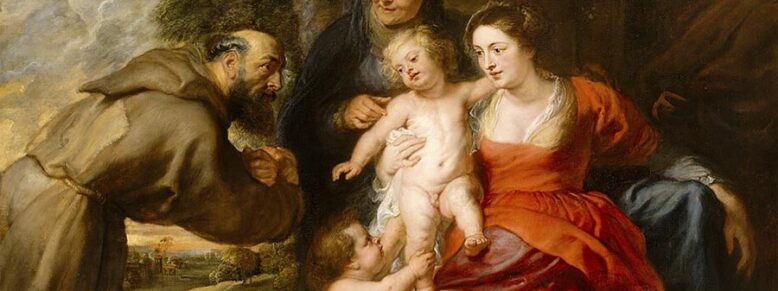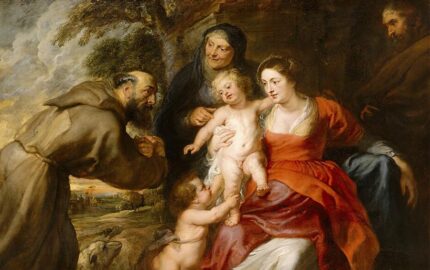The primacy of the family and of the Church
Just as Rerum novarum could be described as the “workers’ encyclical”, it could also be described as the “family encyclical”. It is noted that the family is a “true society” which should govern itself. (13) The family has rights prior to those of the community, and these rights arise from nature. It is stated firmly that: “The contention, then, that the civil government should at its option intrude into and exercise intimate control over the family and the household is a great and pernicious error.” (14) The state should assist a family if it needs aid and cannot get help from wider family or friends. Furthermore, the public authority should only step into the workings of the family to ensure that legitimate rights are enforced (perhaps if there is abuse or violence). Rulers, it is argued, should go no further (“nature bids them stop”) because parental authority cannot be absorbed by the state. The encyclical notes: “The socialists, therefore, in setting aside the parent and setting up a State supervision [sic], act against natural justice, and destroy the structure of the home.”
It is argued that no practical solution will be found to the questions under discussion that does not incorporate religion and the authority of the Church: “All the striving of men will be in vain if they leave out the Church.” (16) The Church enlightens the mind, guides actions by her precepts, helps working people through the many associations she establishes, and also indicates where intervention by the state is necessary. It is then pointed out that inequality is both natural and advantageous, arising, as it does, from the many differences between people. (17) Also, there will always be suffering, and those who pretend otherwise are deluding us and will bring forth ills worse than any from which people suffer currently. (18)
Class conflict, the uses of riches and Church institutions
Throughout the encyclical, class conflict is explicitly rejected because labour needs capital, and capital needs labour: “Mutual agreement results in the beauty of a good order, while perpetual conflict necessarily produces confusion and savage barbarity.” (19).
The duties of employers to employees (and the other way round) are then laid out. (20)
Regarding the former:
- Every worker must have his dignity respected
- Workers must not be misused for gain, but working for gain is noble
- Workers must have time for religious duties and should not be exposed to corrupting influences
- Workers should not be led to neglect their families or taxed beyond their strength, making allowances for sex and age
The question of how to determine wages was then discussed. It was recognised that many things should be considered. However, somebody’s weakness or desperation should not be a consideration. (20)
The question of the responsibilities of the rich, and the account which they will have to make at the last judgement, alluded to in Part One, is now addressed explicitly.
Riches are obstacles to heaven, and the rich should “tremble at the threatenings of Jesus Christ” to whom “a most strict account must be given to the supreme judge for all we possess.” The sharing of possessions with those in need is a duty only to be enforced by the law in extreme cases, but we must be generous with our riches. The distinction between our obligations under the law and those out of the generosity of our hearts is stressed. (22)
It is also stated clearly that poverty is no disgrace, as Christ became poor for our sake. And there is nothing to be ashamed of in working for a living. Jesus not only spent most of His life as a carpenter, He was known by his trade: “Is not this the carpenter, the son of Mary?” (23) It is our moral qualities and virtue that will lead to eternal happiness, not our status. Rich and poor need to join hands in concord and not indulge in class conflict. Strife would quickly cease if it were understood that we are all children of God. We all have a desire for the same last end, and the last end of eternal happiness is only withheld from the unworthy. The Church alone can reach our hearts and consciences so that we will love God and break down any barrier that blocks the way to virtue.
As well as the teachings of the Church, we also have her institutions within what we might now call “civil society”. These have lifted up the human race. If society is to be healed, there can be no other way than returning to the Christian life and Christian institutions. (27) Though the Church is pre-occupied with spiritual concerns, she does not neglect earthly interests, and she desires that the poor rise out of poverty. The Church has always maintained many associations that provide relief to the poor, and this is an activity that was admired even by the enemies of the Church. (29) The proposed systems of relief that are to be organized by the state will never make up for the devotedness and self-sacrifice of charity which should be drawn from the most Sacred Heart of Jesus Christ. (31)
The role of the state – the “preferential option for poor”?
However, we should ask what part the state should play in providing relief, and the encyclical moves on to address this.
Rerum Novarum makes clear that any government should be properly constituted from a Christian perspective. The laws and general administration of the state should be such as to promote public well-being and private prosperity. This requires “moral rule, well-regulated family life, respect for religion and justice, the moderation and fair imposing of public taxes, the progress of the arts and of trade…”. This way, it is argued, every citizen will be happier and there will be peace and prosperity. Furthermore: “The more that is done for the benefit of the working classes by the general laws of the country, the less need will there be to seek for special means to relieve them.” (32) This is a point that would resonate with those economists who stress the importance of good governance and the rule of law for economic development.
All citizens should contribute to the common good of a nation, and they also share in the common good. But all citizens do not contribute to the same extent or in the same way. Those who govern the nation, and defend it in times of war, should be held in high esteem. Those who have a trade contribute to society in a different way, and government must watch over the interests of the working class so that they receive what is their due. It is for the good of all society that the working classes are treated with justice.
Once again, it is emphasized that the state must not absorb the individual or the family. Both must be allowed “free and untrammeled action” consistent with the common good. The power to rule comes from God and, just as God acts with a fatherly love, the state should also serve the community. (35
Situations where the state might intervene through the “aid and authority of the law” are mentioned. (36) These include (inter alia) where any particular class is threatened with harm; maintaining peace and good order and a high standard of morality; where a strike puts people in imminent danger or may lead to a disturbance of the peace; where workers do not have time for religious duties; or where employers impose degrading conditions. However, “the law must not undertake more, nor proceed further, than is required for the remedy of the evil or the removal of the mischief.” (36) Again, this is consistent with the primacy of the family and civil society.
In 37, a sort of “preferential option for the poor” is introduced. It suggests that the rich are better able to look after themselves and need less help from the state, but the poor need to be given special consideration – this especially includes wage-earners.
In the following paragraph, Pope Leo returns to the right to property which must be protected: nobody should seize what belongs to another in the name of equality or otherwise. It is argued that workers better themselves by justly acquiring property rather than by taking that of another person. The law should put a stop to revolutionaries who want to lay their “violent hands” on the property of others, and we should protect the working class from them and stop the working class from being led astray. (38)
Part Three will examine the later part of the encyclical which deals directly with the condition of workers, wages, unions and associations that assist workers.
—
—
Image by ChatGPT







